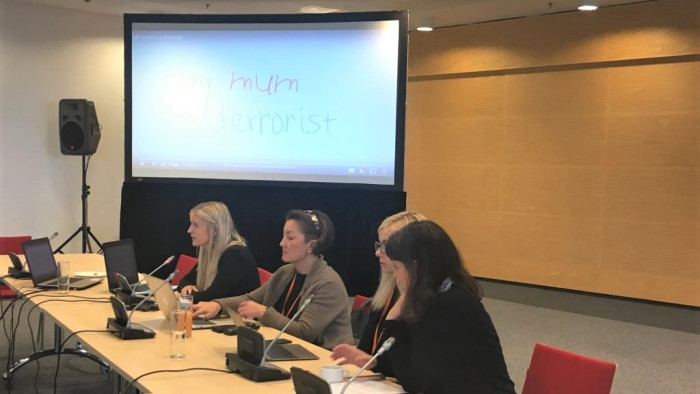
In September, Fair Trials co-organised a side event at the OSCE’s Human Dimension Implementation Meeting on the human rights impact of overly broad definitions of terrorism and extremism in the OSCE region. The event was co-organised by Article 19 and SOVA Center for Information and Analysis.
The event launched the new report Fundamental Freedoms on Trial: The human rights impact of broad counter-terrorism and anti-extremism laws which was produced by the Working Group on Counter-Terrorism, Anti-Extremism and Human Rights of the Civic Solidarity Platform. The report reveals that in countries across the OSCE region, overly broad laws are restricting fundamental rights such as freedom of expression and freedom of religion. In some cases, Governments are deliberately misusing laws to target political dissent, religious groups, human rights defenders, journalists and civil society organisations under the guise of national security. This is, in part, because of a failure to reach an internationally accepted definition of terrorism or extremism, which has left states with wide discretion over which groups and individuals are targeted as terrorist or extremists.
Joanna Szymanska from Article 19 gave an overview of a new joint report with SOVA Center on Russia’s anti-extremism laws: Rights in extremis: Russias anti-extremism practices from an international perspective. The report addresses Russia’s problematic implementation of extremism related legislation and its failure to comply with international freedom of expression standards.
This is because the way in which extremism is conceptualised and legislated against varies across the OSCE region. For example, most EU countries may have national policies to counter extremism, but extremism is not a legal category of offences. In contrast, in Russia and some Central Asian states, in addition to legislation that prohibits terrorism and terrorist activities, there is also a separate category of legislation that prohibits extremist activities, organisations, materials and symbols, which often include incitement to hatred offences. This anti-extremism legislation is overly vague, blurring the concept of extremism with hate speech and separatist speech, and the use of it in many cases violates international human rights law on freedom of expression.
At the event, Maria Kravchenko from SOVA Center provided an analysis of the new Shanghai Cooperation Organisation’s (SCO) Convention on Countering Extremism. The Convention borrows from extremism legislation in Russia, and risks the proliferation of these overly broad and easily abused laws across the whole SCO region, which currently covers almost 44% of the world’s population. The new Convention also states that if someone is accused of an extremism offence, SCO states are required to refuse them refugee status, meaning anyone subject to abusive prosecutions would have to flee the entire region in order to escape persecution.
Anara Ibrayeva from the Public Association Dignity in Kazakhstan spoke about the real-life effects that these laws are having, particularly on human rights defenders, who have been prosecuted for extremism simply for trying to hold the Government to account and raise human rights issues. She also described how courts were failing to uphold the rule of law and international human rights standards, and that torture, corruption, and lack of presumption of innocence remain serious challenges to the right to a fair trial in Kazakhstan.
Overly broad counter-terrorism and anti-extremism laws are having a profound effect on the fairness of criminal justice systems across the OSCE region. Laws that are non-compliant with international law and allow states the discretion to target government critics through prosecution, effectively weaponise the criminal justice system against society and put fundamental freedoms on trial.
Read more about which countries are failing to protect human rights in the full report here, watch our new animation which shows the devastating impact that the abuse of these laws can have on people and their families, and join the conversation on social media by using the hashtag #FreedomsOnTrial.
The event, report and animation were produced with the financial support of the Federal Foreign Office of the Federal Republic of Germany.


